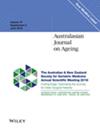Using real-time Delphi methods to develop a consensus-based framework to improve nursing assessment in residential aged care
Abstract
Objectives
Evidence-based tools are needed to support aged care nurses in recognising and responding to changes in residents' conditions and clinical deterioration. Systematised emergency nursing frameworks such as HIRAID® (History including Infection risk, Red flags, Assessment, Interventions, Diagnostics, reassessment and communication) assist nurses in accurately assessing and documenting a patient's condition and identifying and prioritising care needs. This study aimed to adapt the HIRAID® emergency nursing framework for use in the residential aged care setting.
Methods
A real-time Delphi method was employed to contextually adapt the HIRAID® framework. Twelve expert health-care clinical leaders with understanding of patient assessment and residential aged care management were recruited through purposive sampling. Panel consensus was established a priori at 80%. A secondary measure of panel stability was used to understand panel consensus.
Results
Consensus was reached after two survey rounds. In Round 1, 105 (88%) of 119 items were accepted after reaching consensus. In Round 2, all remaining 29 items reached consensus, whereby 20 were accepted and nine rejected. Key modifications were identified for ‘History’, which needed to consider more comprehensive and adaptive techniques, and ‘Interventions’ and ‘Diagnostics’, where differences arose in the scope of practice of aged care nurses compared to their acute care counterparts.
Conclusion
The study demonstrated how a small expert multidisciplinary health-care panel can be stable and reach consensus to adapt and contextualise an emergency care framework to the aged care setting. These findings will form the content to scaffold educational resources to support learning and practice change.

 求助内容:
求助内容: 应助结果提醒方式:
应助结果提醒方式:


